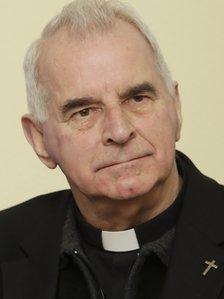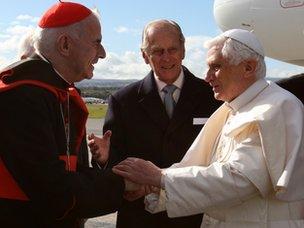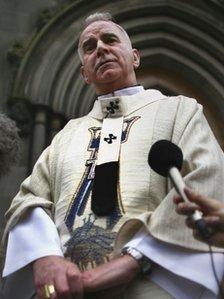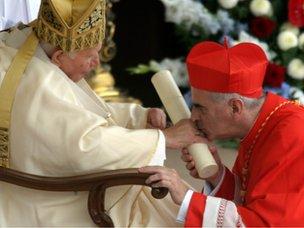Cardinal O'Brien's Departure Leaves a Rudderless Church
By Robert Pigott
Even if you're not a Scottish Catholic, the case of the disappearing cardinal has an unsettling effect. So much about the case against Cardinal Keith O'Brien, until Monday the leader of the Catholic Church in Scotland, is unknown. Even he is said by a close colleague to be unaware of who his accusers are, and exactly what they claim he did. The cardinal has said that he "contests" the claims against him. Yet he has paid an extremely heavy price - resigning barely two weeks short of his 75th birthday, when he could have retired with dignity at the end of an illustrious career. So why did he choose to go? It is clear Cardinal O'Brien was pushed more than he jumped. He might not have been sacked exactly, but the decisive pressure came from Rome. Vatican officials evidently became alarmed at the nature of the allegations against Cardinal O'Brien. A number of other cardinals are travelling to Rome to bid farewell to Pope Benedict over lunch on Thursday, and to vote for his successor, with allegations connected with their handling of the sex abuse scandal hanging over them. But the difference for Cardinal O'Brien is that he is accused of improper behaviour himself. When he was made aware of the level of concern in Rome about the situation in Scotland he felt he had no alternative but to resign. 'Ignominious end' It is a quirk of the Church's practice that Cardinal O'Brien had already tendered his resignation, as he approached his 75th birthday, the official retirement age for bishops. "He is the archetypal "man of the people" - perhaps not highly sophisticated theologically, but kindly, down to earth, and larger than life”Technically the Pope simply accepted it a couple of weeks early. But there's no disguising the reality - an ignominious end to the career of Scotland's most senior Catholic cleric. It is a move Pope Benedict is likely to have been reluctant to take. He is reported to like Cardinal O'Brien and to have enjoyed his visit to Scotland in September 2010, during which he wore the tartan scarf the cardinal placed, unannounced, round his neck. The Vatican is said to have a positive regard for the Scottish branch of the Church, with its robust defence of core Catholic doctrine, and to compare it favourably with its larger neighbour in England and Wales. The effect of Cardinal O'Brien's fall from grace on the small, intimate, community of the Scottish Catholic Church, is all the greater because of the cardinal's particular personality. For well over a decade he has been one of Scotland's most colourful figures and one of its strongest voices. He is the archetypal "man of the people" - perhaps not highly sophisticated theologically, but kindly, down to earth, and larger than life. In a typical gesture, when Pope Benedict visited Archbishop's House in Edinburgh in 2010, the cardinal invited two non-Catholic tradesmen who had worked on the house to meet him. More than most archbishops, this diminutive, outspoken cleric had come to embody the local Church. That makes his sudden departure, and disappearance behind closed doors, all the more disorientating for Scottish Catholics. 'Vulnerable adult' News of how he is faring there, in the disappointment and shock of events, besieged by cameras and reporters, has leaked out. It seems Cardinal O'Brien was unaware of the allegations from three priests in his diocese, and a former priest, when he gave a confident and upbeat interview to the BBC last Friday. The cardinal showed off one of the slips used by cardinals to elect a pope, and talked about the "almost frightening" responsibility of electing a new pontiff. With evident pride he opened the pages of an album that included pictures of him with Pope Benedict. It was not the behaviour of a cardinal who would within hours be taking the highly unusual step of foregoing his right to take part in the conclave. When the news of the allegations broke it seems Cardinal O'Brien was baffled, bemused, and distressed, unable to know at first how to react. A sign of his disabling distress came hours after the story was published, when he failed to attend a mass on Sunday morning to celebrate Pope Benedict's reign at St Mary's Cathedral in Edinburgh. The cardinal had been due to lead the service. The assistant bishop, Stephen Robson, was left to acknowledge his absence, and the claims against him, "with a heavy heart". Insiders say the effect on the cardinal, as his world has collapsed, has been profound. A close colleague described him as "very sad", and likened him to "a vulnerable adult". As the Church descended into turmoil beyond the wrought iron gates of Archbishop's House, it seems the cardinal might not have realised how final was his departure from high office. After all, he has resigned only as Archbishop of St Andrew's and Edinburgh, not as cardinal. Perhaps, he apparently mused, he could return to some honorific role. But short of a complete exoneration, even that shred of dignity seems likely to be denied him. 'Moral failings' Cardinal O'Brien has said that he "contests" the claims against him, but he has refused to deny them outright. A statement on Monday conspicuously lacked a rebuttal. Resolution, and public explanation, will have to wait for new leadership in the diocese. An "apostolic administrator" is due to be installed - a senior cleric to run the diocese until a permanent replacement is found. In the absence of this caretaker - who has already been chosen - the diocese has a rudderless atmosphere. The initial inquiry will be carried out by the Church - and will, according to senior Catholics close to Cardinal O'Brien, encounter a murky brew of resentments and disappointed ambition. They speak darkly of a small intimate world of confidences, intrigues, jealousies and grievances nursed over years. They claim, in short, that there are two sides to this, as yet untold, story, and insist that the episode came about as Cardinal O'Brien's retirement - and then withdrawal from the conclave - provided a final opportunity to wound him. But, however the complaints came about, any finding that even the much younger Keith O'Brien used a position of superiority to behave inappropriately towards a priest or seminarian in his care will not be easily excused. Any finding against him is likely to be compared to his outspoken criticism of homosexual relationships as "harmful to the physical, mental and spiritual wellbeing of those involved", and to his denunciation of gay marriage as a "grotesque subversion of a universally accepted human right". Cardinal O'Brien has been a stern critic of what he sees as moral failings in others. The nature of the Catholic Church in Scotland also makes the crisis - described by Professor Tom Devine of Edinburgh University as the "worst since the Reformation" - all the harder to weather. It already has an ageing leadership and, of its eight dioceses, three are now vacant, and two more have bishops who might have expected to relinquish the burden. Some observers speak of a flabby style of management, hidebound by hierarchy. The risk of a rigid hierarchy is that if its figurehead is found to have feet of clay - and that still has to be established, of course - then the damage is great. Potentially, one of the most important lasting effects of the crisis could be in the way the Church is organised. Senior Catholics would like to see fundamental reform. They want a leaner, more businesslike, structure, fewer bishops, and a less hierarchical approach. This painful and confusing time for Scottish Catholics could also be their big opportunity.
|
.
Any original material on these pages is copyright © BishopAccountability.org 2004. Reproduce freely with attribution.



